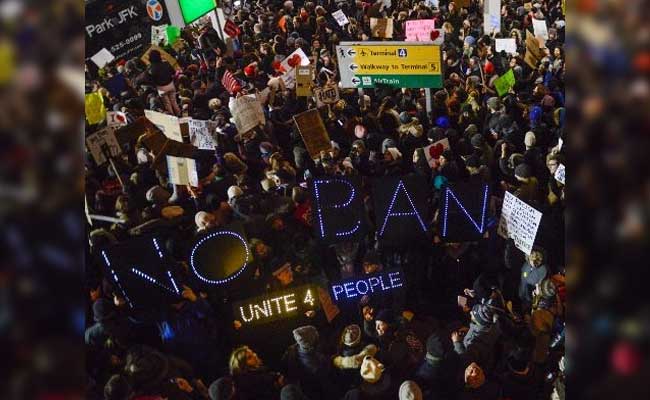
US President Trump has banned immigrants from Iran, Iraq, Libya, Sudan, Yemen, Syria and Somalia.
Washington:
The Donald Trump Administration had initially considered putting Pakistan into the controversial immigration ban list, White House Chief of Staff Reince Priebus has acknowledged. He further hinted that the ban - which restricts refugees, migrants and green-card holders from seven Muslim-dominated nations - could extend to Pakistan in the near future. The seven-nations currently affected by Donald Trump's immigration ban are Syria, Iran, Iraq, Libya, Somalia, Yemen and Libya.
"Those were the seven countries that both, Congress and the Obama Administration, identified as being the seven countries that were most identifiable with dangerous terrorism taking place in their country," Mr Priebus said, in an interview, to CBS News.
"Now you can point to other countries that have similar problems, like Pakistan and others. Perhaps, we need to take it further. But for now, immediate steps, pulling the band-aid off, is to do further vetting for people travelling in and out of those countries," the White House official added.
Presently, visitors from Afghanistan and Pakistan are subject to extreme vetting in the United States, as per Mr Trump's executive order. United States is home to thousands of Pakistani-Americans and Pakistani permanent residents. In the interview, Mr Priebus justified the ban and stated that the Trump Administration's priority is to protect Americans.
In the interview, Mr Priebus justified the ban and stated that the Trump Administration's priority is to protect Americans.
"These are the countries that harbor and train terrorists. These are the countries that we want to know who is coming and going in and out of, to prevent calamities from happening in this country," he said.
"We are not willing to be wrong on this subject. President Trump is not willing to take chances on this subject. He was elected president in many respects because people knew that he was going to be tough on immigration from countries that harbor terrorists," the White House Chief of Staff added.
Mr Trump's immigration ban has met with widespread criticism from political leaders and human rights activists. Protests against the Trump Administration intensified in many parts of United States. A federal judge blocked part of the ban and ordered authorities to stop deporting refugees and other travelers stuck at US airports.
However, the Administration has shown no signs of backing down and the US Department of Homeland Security has said that it would continue to enforce the order but comply with the court's order.
(with inputs from Agencies)
"Those were the seven countries that both, Congress and the Obama Administration, identified as being the seven countries that were most identifiable with dangerous terrorism taking place in their country," Mr Priebus said, in an interview, to CBS News.
"Now you can point to other countries that have similar problems, like Pakistan and others. Perhaps, we need to take it further. But for now, immediate steps, pulling the band-aid off, is to do further vetting for people travelling in and out of those countries," the White House official added.
Presently, visitors from Afghanistan and Pakistan are subject to extreme vetting in the United States, as per Mr Trump's executive order. United States is home to thousands of Pakistani-Americans and Pakistani permanent residents.

Donald Trump's ban on immigration from 7 nations has led to widespread protest.
"These are the countries that harbor and train terrorists. These are the countries that we want to know who is coming and going in and out of, to prevent calamities from happening in this country," he said.
"We are not willing to be wrong on this subject. President Trump is not willing to take chances on this subject. He was elected president in many respects because people knew that he was going to be tough on immigration from countries that harbor terrorists," the White House Chief of Staff added.
Mr Trump's immigration ban has met with widespread criticism from political leaders and human rights activists. Protests against the Trump Administration intensified in many parts of United States. A federal judge blocked part of the ban and ordered authorities to stop deporting refugees and other travelers stuck at US airports.
However, the Administration has shown no signs of backing down and the US Department of Homeland Security has said that it would continue to enforce the order but comply with the court's order.
(with inputs from Agencies)
Track Latest News Live on NDTV.com and get news updates from India and around the world

